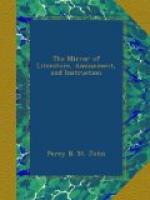In 1830, Mr. Brougham supported Lord John Russell’s plan for Parliamentary Reform, as an amendment to a motion of Mr. O’Connell; in which Mr. Brougham opposed universal suffrage and vote by ballot. In the same week also, he spoke at some length on the punishment of Forgery by death. The opinions which he expressed, Mr. Brougham said, he had learned from his great and lamented friend, Sir Samuel Romilly; and he concluded by expressing his hope that he should live to see the day when this stain should be removed from our statute-book. In the following month Mr. Brougham brought in a bill for local jurisdictions in England, for diminishing the expense of legal proceedings. On June 24, Mr. Brougham spoke at great length upon the inadequacy of the ministerial bill for the reform of the Court of Chancery. On July 13, he moved for the abolition of West India Slavery, and expatiated at great length and with extreme earnestness—first, on the right of the mother country to legislate for the colonies, and next on the legal and moral nature of slavery.
Upon the dissolution of parliament, consequent upon the death of George IV., Mr. Brougham was invited to the representation of the extensive and wealthy county of York. In his speech to the electors he alluded to Parliamentary Reform, a revision of the Corn Laws, and the extinction of Colonial Slavery, as three grand objects of his ambition; and concluded by thus explaining his becoming a candidate—“because it would arm him with an extraordinary and a vast and important accession of power to serve the people of England.” It need scarcely be added, that his election was secured; his return was free of all expense: indeed, never was triumph more complete.[3]
Soon after the assembling of the new parliament, Mr. Brougham, in connexion with the topic of the recent revolutions on the continent, and parliamentary reform in this country, concluded an interesting debate by saying—“He was for reform—for preserving, not for pulling down—for restoration, not for revolution. He was a shallow politician, a miserable reasoner, and he thought no very trustworthy man, who argued, that because the people of Paris had justifiably and gloriously resisted lawless oppression, the people of London and Dublin ought to rise for reform. Devoted as he was to the cause of parliamentary reform, he did not consider that the refusal of that benefit, or, he would say, that right, to the people of this country (if it were a legal refusal by King, Lords, and Commons, which he hoped to God would not take place) would be in the slightest degree a parallel case to any thing which had happened in France.”
Mr. Brougham’s elevation to the exalted station which he now fills need be related but briefly, since the particulars must be fresh in the recollection of our readers. Upon the resignation of the Wellington ministry—with the title of BARON BROUGHAM AND VAUX, he took the oaths as Lord Chancellor, November 22, and his seat in the Chancery Court on November 25, 1830.




